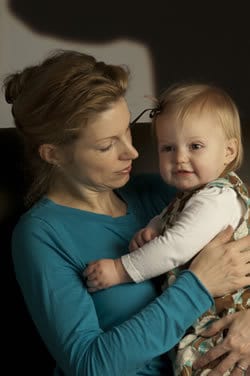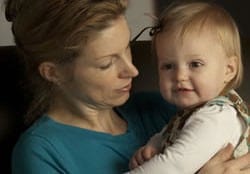Full Circle: UAMS Doctor Finds Peace After a Two-Time Battle with Rare Form of Leukemia
|  Tired, worn down and fighting off the routine rigors of an intense residency program, Samantha McKelvey, M.D., was too focused on the many tasks at hand to pay much mind to her own physical well-being.
Tired, worn down and fighting off the routine rigors of an intense residency program, Samantha McKelvey, M.D., was too focused on the many tasks at hand to pay much mind to her own physical well-being.
That is, until a growing lump on her neck became so noticeable that those around her were finally able to convince the strong-willed obstetrician-in-training to get it checked out. After a couple days of antibiotics in hopes the growing mass was simply the result of an infection, it was only getting worse.
“I finally went to a physician and they immediately did a biopsy and blood work,” said McKelvey, now an assistant program director in the UAMS Department of Obstetrics
and Gynecology. “I was on call that night, so I was just going to get this done and get back to work. The doctor called me back later and asked me if I was sitting down. I knew then it wasn’t going to be good.”
McKelvey, then 28, was told she had leukemia that was so advanced she immediately needed to be hospitalized to get a blood and platelet transfusion and begin chemotherapy.
Failing to accept the gravity of the situation, McKelvey says she was still thinking, “I can’t do that. I’m on call!”
Reality Sets In
McKelvey was diagnosed with Acute Myelogenous Leukemia (AML), an extremely fast-growing cancer of the blood and bone marrow.
“When I started chemotherapy, I had a very dark prognosis and was given about 10 months to live,” McKelvey said. “My leukemia was a very rare form that’s known for its tendency for recurrence. So basically, even if they fixed it, in all likelihood, it’d be back. At that point, I thought my life was over.”
Rallying around her was a strong family steeped in the medical profession, including her father, David McKelvey, M.D.; and her brother, Kent McKelvey, M.D., director of Cancer Genetics Services at the UAMS Winthrop P. Rockefeller Cancer Institute., and her sister, Betsy McKelvey, a neonatal nurse practitioner at Arkansas Children’s Hospital.
An allogeneic bone marrow transplant became McKelvey’s only chance to beat her leukemia. Allogeneic transplants involve the transplantation of bone marrow from a donor, rather than harvesting and using the patient’s own cells.
Following her diagnosis and the diagnosis of former Arkansas Lt. Gov. Winthrop P. Rockefeller with myeloproliferative disease, which can lead to leukemia, the two became acquainted and spoke of the difficulties of being treated far from home, particularly at time with home and family are needed most.
Rockefeller traveled to Fred Hutchinson Cancer Center in Seattle for treatment. He died in 2006.
After prep work at the UAMS Cancer Institute, McKelvey went to M.D. Anderson Cancer Center in Houston to begin the transplant process. Following an anxious two-week process in Houston of testing McKelvey’s family members’ bone marrow, a match wasn’t found.
McKelvey entered her name in a national donor pool, and returned to UAMS to continue chemotherapy. “It didn’t look good at that point,” she said.
To Protect and Serve
But three months later, a 25-year-old American soldier in Iraq matched, and both he and the U.S. Department of Defense agreed to make the transplant a reality.
“So many people aren’t that lucky,” McKelvey said.
Following the transplant, she went into remission and returned to her residency program after missing just one year.
In 2005, McKelvey’s leukemia recurred, and she was forced to muscle through the entire process of chemotherapy and a stem cell transplant once again.
“There are really no statistics on doing it twice,” McKelvey said. “I reached a low point and had prepared myself for the worst.”
The resilient and competitive nature that had gotten McKelvey through the first process had fallen by the wayside, so much so that while doing routine tasks, she often found herself thinking, “This is probably the last time I’ll do that,” she said.
But with the same bone marrow donor willing to donate again, she reignited her energy and began the process for a second time. After taking two years off from her residency for treatment, she went back into remission, fully recovered and returned to finish the program.
Circle of Life
McKelvey and her “extremely supportive” husband, Brian Teeter, whom she’s dated since she was 18, recently celebrated not only the five-year anniversary of her second transplant, but also the first birthday of their daughter, Helen.
The two experiences have shone a new light on what’s important in life, McKelvey said.
“It makes you realize the value of all of the relationships you have in life,” she said. “I’m now very proud of the work and effort I put into growing a lot of the relationships I have with people surrounding me.”
The relationship with her donor that twice saved her life, however, will remain understated. McKelvey has since contacted him, though she said he’s more comfortable with limited contact.
“I’ve sent cards, gifts and letters and we’ve had a small amount of contact, but we’ve never met face to face,” she said.
That relationship came full circle when she learned that during her donor’s military leave to donate bone marrow, the timing was right for him to witness the birth of his child.
“There’s some kind of poetry in that,” she said. “It seems like that situation was just meant to be.”
Under the care of Peter Emanuel, M.D., director of the Cancer Institute and an expert in treating both pediatric and adult forms of leukemia, since her second recurrence, McKelvey says her routine checkups and procedures are no longer anxious moments.
“About a year into it I thought, ‘It’s clear I’m not going to die, because I’m still here, and there’s a reason I’m supposed to be here,’” McKelvey said. “Because of the unbelievable sacrifice of a complete stranger, I’m here and living a normal life.”
The Many Gifts of Life
Samantha McKelvey, M.D., knows all about the gift of life.
After a selfless donor twice traveled halfway around the world from Iraq to donate his matching bone marrow to save McKelvey’s life, she’s now fully recovered and paying that gift forward into the arms of anxious new parents in the UAMS Department of Obstetrics and Gynecology.
“I love delivering babies and being a part of that excitement with new parents and their families,” McKelvey said. “I guess I haven’t really thought of it in terms of giving back a life, but it’s a neat way to look at it.”
A recent landmark also highlighted yet another gift of life in McKelvey’s and her husband, Brian Teeter’s, worlds. The couple celebrated the first birthday of their daughter, Helen, who was born by a “kind and generous” surrogate.
“And again, thanks to the kindness of a complete stranger at that time, we were given this beautiful gift in our lives,” McKelvey said. “When I think back to my darkest hours when I wasn’t sure if I was going to live or not and remembering how horrible I looked and felt, it’s overwhelming sometimes how things have turned out. Life is a beautiful thing, and we’re very lucky and thankful to be a part of this amazing circle.”
